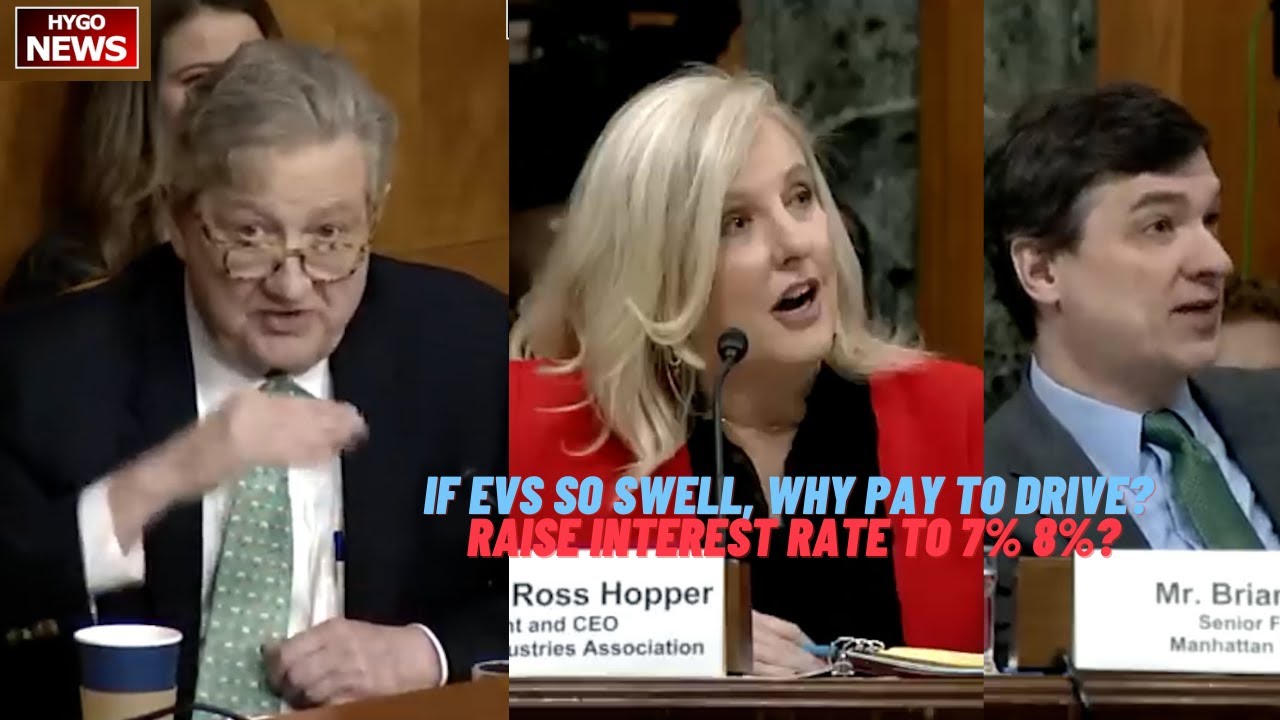On 5/4/2023, The United States Senate Committee on the Budget held a hearing on the Republican debt limit bill passed in the House. Witnesses include Mark Zandi, Chief Economist at Moody’s Analytics; Abigail Ross Hopper, President and CEO of Solar Energy Industries Associations; Brian Riedl, Senior Fellow at Manhattan Institute. They testified before the Senate Budget Committee as the panel holds a hearing on the Republican proposal to address the debt limit, which passed in the House last week, at the Capitol in Washington.
Kennedy: Miss, I can’t say your name, I can’t see what’s happening.
Hopper: It’s Hopper.
Kennedy: It’s Hopper. I, I love solar energy. I just want you to know that. And I love electric cars. But I’ve got to ask you this question I’ve been waiting to ask. This, if electric cars are so swell, how come the government has to pay people to drive them?
So, I think, um, like most government policies, right, are put in place to incentivize certain behaviors. And so, that’s part of the policy, is that if we want more…
Kennedy: But if they’re so swell, why couldn’t they, in just a competitive market, you know, people, why wouldn’t they be choosing EVs, electric vehicles, over internal combustion engine cars?
Hopper: I think that,
Kennedy: why do we have to pay people to drive them?
Hopper: Well, I wouldn’t characterize it as paying people to drive them, but I would sure say we are getting a big old tax credit from the government. Having a policy to incentivize more purchases of electric vehicles.
Kennedy: Okay, thank you, Mr. Chairman.
Kennedy questions Riedl at Manhattan Inst in Budget hearing on debt limit
Kennedy: Did you know that if you look at history, at all ten of these times when we had to reduce inflation, that in order to get inflation down two percent, we had to raise, on average, um, the Federal Reserve had to raise interest rates such that it raised unemployment about 3.6 percent. Did you know that?
Riedl: That is correct, that sounds similar to what Mr. Summers has said. He’s made similar points. That one’s very correct.
Kennedy: Okay, all right. so, the current unemployment rate is 3.5 percent, is it not?
Riedl: Yes.
Kennedy: And the current inflation rate is five percent, is it not?
Riedl: approximately
Kennedy: So, if history tells us that in order to get inflation down two percent, the Federal Reserve has to raise interest rates such that it increases unemployment 3.6 percent, then if you do the math, given that the current unemployment rate is three and a half percent and the current inflation rate is five percent, that would indicate, would it not, that the Federal Reserve, if history is any indication, will probably have to eventually raise interest rates to between seven and eight percent. Is that correct?
Riedl: It could have to go that high, depending on how the economy responds to current
Kennedy: rights. Okay. Now, can we agree that the best way to get inflation down is to attack it on the fiscal side and the monetary side?
Riedl: Absolutely, we can agree on that.
Kennedy: Well, bringing the economy into a recession.
Riedl: Okay, we can agree on that.
Kennedy: And when you attack it on the monetary side, the Federal Reserve raises interest rates. It’s trying to slow the economy. It doesn’t want to, but the way you measure the slowing of the economy is the unemployment rate. When you attack it on the fiscal side, you reduce your rate of growth of spending and debt accumulation. Did I describe that right?
Riedl: You did.
Kennedy: So, is it not the case that if you vote against slowing the rate of growth of spending and debt accumulation, you’re voting to raise interest rates even higher, are you not?
Riedl: Generally, I would agree with that approach, with that viewpoint.
Kennedy: Yeah, I mean, that’s just basic economics 101, right?
Riedl: Right, the Federal Reserve’s tool,
Kennedy: I mean, that’s something, yeah.
https://www.facebook.com/HygoNewsUSA/videos/276525771469673
Kennedy: if EVs so swell, why pay people to drive them? JPowell will raise interest rate to 7% or 8%?

